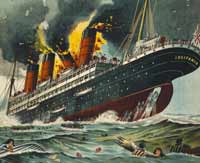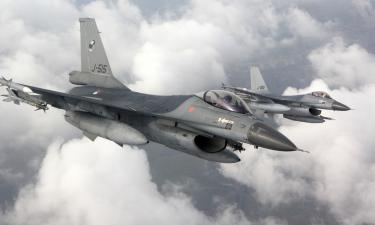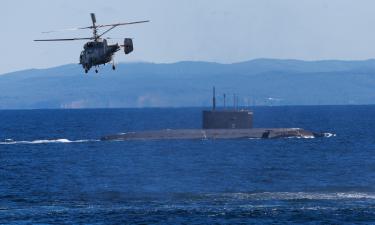The sinking of Lusitania to ravage British and American treasuries
Divers made a sensational discovery during the examination of the Lusitania ocean liner which sank in 1915. They confirmed the version, according to which Britain and the USA used civil passenger vessels to smuggle arms, jeopardizing the lives of thousands of civilians. The passengers of the liner were virtually used as the human shield in the event the liner was going to be attacked by the German navy.

The divers found war supplies on board the Lusitania liner, which sank on May 7, 1915 off the coast of Ireland. Most of the passengers – 1,198 people, including 139 American citizens – were killed in the tragedy. The event, which the media described as the largest military crime in history, sparked numerous protests in the world and had the USA involved in WWI.
Europe found itself in the middle of an arms race on the threshold of WWI. Great Britain tried to mislead the enemy regarding its military power. The country was building both conventional and reserve battleships that were guised under civil vessels. The latter included large ocean liners, which Britain planned to use within the structure of its navy in case of necessity. The 31,000-tonnage Lusitania was one of the largest ships of that time.
Indeed, cannon platforms and ammunition hoists were mounted on the Lusitania and other vessels of the type as soon as the war broke out. However, Britain was forced to give up the original idea of their usage because of the fear of the ‘newest German weapon’ – submarines, for which a large ocean liner was a very good target. Once mobilized for military purposes, the Lusitania became a plain, albeit a huge, passenger ocean liner again.
The British industry found itself not ready for the world war and was unable to meet the demands of the nation’s defense industry. The ocean liners were eventually used as contraband ships. The Lusitania sailed on her deadly voyage from New York to Liverpool on May 1, 1915. A German U-20 submarine torpedoed the liner a week later.
The German media immediately wrote that there were explosive substances and military hardware on board the liner. Britain and the United States rejected the affirmation.
Needless to say that the truth about the ocean liner would have remained a mystery for it was extremely difficult to submerge at the depth of over 100 meters, where the Lusitania was resting. Things have changed nowadays. It turned out that the ship was carrying many cases of Remington bullets.
A narrow circle of professional historians did not find the discovery surprising. The information about the cargo on board the sunken liner originally appeared as a result of the independent investigation conducted by British journalist Colin Simpson. The journalist concluded that the ship was carrying US-made explosives. The Briton particularly found that there were 3,800 boxes of “cheese” among the cargo on board the liner. The boxes were registered on US citizen A. Frazer, who turned out to be a debtor having no right for commerce according to US laws. Therefore, the US authorities used him as a figurehead to smuggle the military products made by DuPont.
Secondly, London officially acknowledged that there was a small stock of bullets on board the sunken liner. However, the acknowledgement did not change anything about the civil status of the liner.
All the above-mentioned facts proved that there was a military cargo on board the liner.
US newspapers wrote shortly before the Lusitania set off on her last voyage that it was dangerous for US citizens to stay on board British passenger liners. The warning was originally made by the German Embassy in the USA. The embassy was informed that the Lusitania would carry a large military cargo. The passengers of the ocean liner were told that no German ship could catch up with the high-speed liner, whereas British battleships would protect the Lusitania from a possible submarine attack. Nobody escorted the liner, and the Lusitania sank.
Why did it happen ? The answer is simple . On the one hand, Britain was importing military cargoes under the cover of nationals from neutral countries. It was a lucrative game for Great Britain, no matter if Germany destroyed one of such ships. Britain wanted to have the United States involved in the war. Britain’s foreign minister asked a top US official in the spring of 1915 what America would do if Germany ran down a ship with US citizens on board. The official responded that it would be enough to have the United States involved in the war. The war was “delayed” for the US until 1917, when Germany had already been weakened.
To put it in a nutshell, Britain set up the ship with US passengers to ease the war for itself.
The huge vessel sank in only 18 minutes because of the heavy cargo. Captain of the German U-20 submarine Schwieger said that he ordered to fire only one torpedo, although the attack resulted in two massive explosions, which smashed the lower hold and the deck of the liner. The ship sank quickly when the ammunition exploded in her holds.
Even if two torpedoes had struck such a large ship as the Lusitania, she would have remained on the water surface for at least two hours. For example, German submarines fired six torpedoes to attack the Justicia steam boat in 1918. The torpedoed boat stayed afloat for a whole day afterwards, whereas the huge Lusitania sank in just several minutes.
The Embassy of Austria-Hungary in the USA acknowledged in June 1915 that it had informed Germany of the secret cargo on board the Lusitania. The Austrian-Hungarian diplomats feared that it could lead to a war between Vienna and Washington and attempted to find naïve excuses.
It is worthy of note that then-Secretary of State William Bryan condemned the policy of the president, who was aware of the transportation of US war supplies on board British vessels, which was a gross violation of the USA’s neutrality.
The evidence about the sinking of the Lusitania was subsequently stolen from the Austrian-Hungarian Consulate Office. The documents were found only in the 1990s, and it was revealed that the attack had been organized by US special services.
The Lusitania case is another fact to prove that both the British and the American political elite see no moral principles in accomplishing their selfish goals. They are ready to set up the lives of their own nationals for the sake of instantaneous interests.
Sergei Balmasov
Subscribe to Pravda.Ru Telegram channel, Facebook, RSS!





